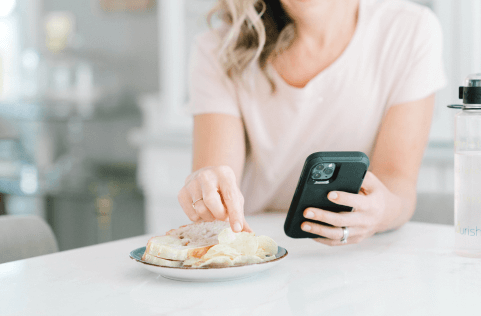Google “Emotional Eating” and you will be presented with a page full of articles detailing the horrors of emotional eating, most of which are laced with toxic diet culture messages (for the record, we don’t actually recommend doing this). Certainly not helpful if you’re looking to heal your relationship with food and are working on appreciating the body you’ve been given.
While emotional eating can feel distressing for many reasons, feeling ashamed and guilty because “diet culture says so” will actually not help stop the cycle of eating emotionally in the long run. Remember the diet cycle and how deprivation only serves to predict future binge eating in the long run? Well, it predicts emotional eating too.
What we see with many clients is a negative spiral of thinking about emotional eating that goes something like this: Feeling a strong and overwhelming sense of emotion that is hard to unpack without a coping mechanism → Leaning on food that is comforting because it’s available and instills an immediate sense of relief → Feeling guilty while eating, and eating past the point of fullness to numb out the negative emotions → Feeling ashamed about eating out of an emotional response because it led to discomfort and perhaps even feeling like a failure - all through the lens of diet culture.
dieting predicts emotional eating
A 2013 study of more than 35,000 men and women found those with a history of dieting experience more emotional eating than those with no history of attempting diets or weight loss.1 This makes sense, as restriction itself can lead to loss of control eating that often feels a lot like emotional eating. Dieting and eating in response to deprivation also bring about their own set of emotions and feelings, and oftentimes we turn to food as a way to deal with negative feelings. Trying to strong-arm your way out of emotional eating without first addressing physical or mental deprivation probably won’t get you to a place where you feel free.

eating is emotional
Before we dive into strategies for compassionately handling emotional eating in your life, let’s first get real about what emotional eating actually is. It’s important to remember that food is inherently emotional.
- When we’re babies, eating is the ultimate form of comfort and nurturance.
- As we grow into children and eventually adults, we don’t eat in an emotionless void. Often eating takes place amongst loved ones and as a part of a celebration or cultural tradition.
- For many, food is love, and how some like to share their appreciation for others.
In short, food is emotional and nurturing from the start, and our brains are wired for it to be that way. The only reason we feel guilty about eating for emotional reasons is that diet culture wants us to believe that eating should be emotionless.
the spectrum of emotional eating
Authors of Intuitive Eating, Elyse Resch and Evelyn Tribole, helpfully illustrate emotional eating as existing on a continuum of intensity that ranges from emotional eating at its most mild (sensory gratification) to most intense (numbing out with food).
Emotional eating can be as mundane as enjoying the taste of a freshly baked chocolate chip cookie because it reminds you of fond childhood memories - something that enhances the satisfaction factor of food and eating. But emotional eating can also be disruptive to wellbeing if it is used in a self-punishing way, or to numb out emotions that represent a basic need not being met.

6 ways to make peace with emotional eating
write down what you're feeling
Take a minute to grab a piece of paper and a pen and write down what you’re feeling. The feelings wheel can help you get specific about the types of emotions that are coming up for you. Taking time to express how you’re feeling will help externalize the strong emotions so they don’t feel so overpowering. Over time, this can also make it easier for you to understand what triggers around you may be bringing them up.
make a coping skill toolbox
It’s helpful to have more than one coping skill to use for dealing with negative and uncomfortable emotions. Using food for comfort is one option, but think of a few others that you can rely on to ensure that you’re not becoming overly dependent on food.
Some options that my clients have found helpful include:
- Going for a slow, gentle walk or spending time in nature.
- Listen to soothing music.
- Do a quick 5-10 minute guided meditation.
- Play with a pet.
- Watch silly videos on YouTube.
- Light a candle or use an essential oil diffuser.
- Take a hot shower or bath.
- Give yourself a manicure or pedicure.
- Lay down with a weighted blanket and turn off the lights.
reflect on basic needs
Basic needs are things like:
- Adequate rest
- Nourishment
- Hydration
- Expressing feelings
- Being heard and accepted
- Receiving comfort
- Experiencing pleasure.
If these things aren’t being met for whatever reason - maybe you weren’t taught that these things were important and don’t know how to meet them yourself - it will understandably be difficult to be kind to yourself. Reflect on what might be missing and how you can take care of your basic needs today.
sit with your feelings
Have you noticed that feelings come and go? Sometimes, your default response to intense feelings might be to distract yourself from the feeling in order to reduce the amount of time spent in discomfort. A big part of healing and getting to know your body is learning how to sit in the uncomfortable. One of our favorite humans, Bri Campos, calls this “Sitting in the Suck” and we are so here for that.
find a distraction
Hey, it’s OK if you don’t feel ready to sit and unpack your strong feelings and emotions right away. That’s understandable! If you find that food is the only way you’re able to take a break or distract yourself from strong emotions, consider that food is not the only option.
Allow yourself to take 5-10 minutes to focus on something light instead of something heavy, whether it’s stress at work or feeling pulled in 500 different directions at home. Put on some music and dance, play a quick game of solitaire, flip through a magazine, or do some quick body stretches.

ask for support
Sometimes eating emotionally can interfere with asking for a bit of extra support when it’s needed. We are all human and can only handle so much. There is no such thing as “doing it all.” Just as diet culture emphasizes an unrealistic thin ideal, we’re under an immense amount of societal pressure to feel like we need to be perfect parents, busy professionals, competitive athletes, and zen relaxers all at the same time. If you find that you’re going to the kitchen for a quick time out because of the pressure you’re feeling to meet your own high expectations of life, consider the power of asking for help.
Help can come from seeking mental health support through a therapist or psychiatrist if needed. It can also come through learning to recognize and set your own boundaries that support your own mental wellbeing, and asking for help when you’re stretched beyond your limits.
Our individualized services (from 1:1 nutrition counseling to our Jumpstart to Intuitive Eating Course) can also provide a great support if you are feeling stuck with your relationship with food. Wherever you are in your process, we want to support you in any way we can.
References:
- Sandrine Péneau, Estelle Ménard, Caroline Méjean, France Bellisle, Serge Hercberg, Sex and dieting modify the association between emotional eating and weight status, The American Journal of Clinical Nutrition, Volume 97, Issue 6, June 2013, Pages 1307–1313
- Evelyn Tribole, Elyse Resch. Intuitive Eating: A Revolutionary Anti-Diet Approach, 4th ed. 2020
Comments Off on 6 Ways to Make Peace with Emotional Eating